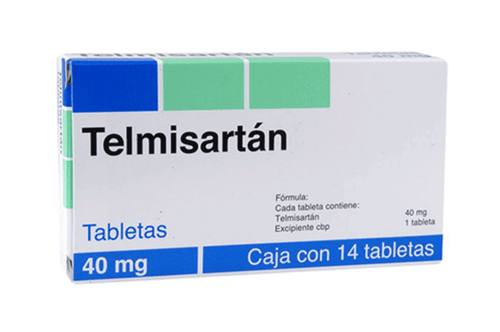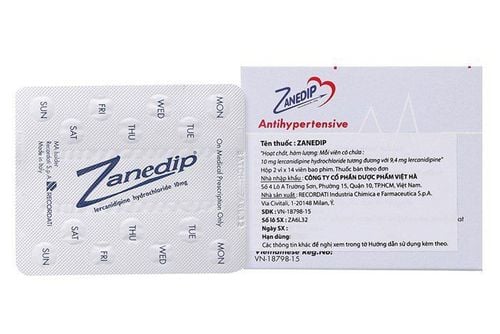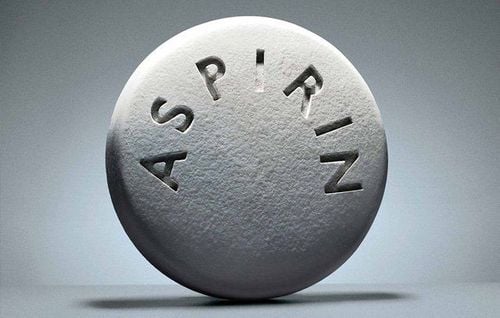This is an automatically translated article.
Accupril is an antihypertensive drug that is also used in cases of congestive heart failure. The drug can be used alone or in combination with other drugs. Here is some information about the drug Accupril.
1. Uses of Accupril
The drug accupril® has the main ingredient Quinapril, which belongs to the group of ACE inhibitors. The drug is prepared with different strengths such as Accupril® tablets with 5 mg, 10 mg, 20 mg strengths.
Quinapril is a potent ACE inhibitor. This ACE-converting enzyme converts Angiotensin I to Angiotensin II, so that Quinapril also blocks angiotensin I to angiotensin II. Angiotensin II is a potent vasoconstrictor that promotes the growth of smooth muscle cells of blood vessels and of the heart. This is a major mechanism of hypertension in patients with essential hypertension. In addition, because it inhibits ACE, it also inhibits the enzyme bradykinin in the lungs, causing this substance to stagnate and potentially causing the cough reflex.
2. Uses of Accupril
Accupril is used in the following cases:
Hypertension: Accupril is indicated in cases of essential hypertension. Accupril is effective when used alone or in combination with other antihypertensive agents such as diuretics and beta-blockers in patients with hypertension. Congestive Heart Failure: Accupril is effective in the treatment of congestive heart failure and is often combined with diuretics and/or cardiac glycosides. Note that Accupril is contraindicated for use in the following cases:
Allergy to Quinapril or to any other ingredient in the drug. There is a history of angioedema with dyspnea, facial swelling, ... when taking ACE inhibitors before, angioedema due to idiopathic or genetic causes. Concomitant use of Accupril with products containing aliskiren is contraindicated in patients with diabetes. Pregnant women: Contraindicated for pregnant women in the second and third trimesters of pregnancy. Women during lactation. It's not suitable for children.
3. Dosage and how to use Accupril
How to use: The drug is taken orally, swallow the tablet whole with water and should be taken at the same time of day.
Dosage: Dosage of Accupril should be based on the individual patient and blood pressure response.
Hypertension
Single-drug therapy: The recommended initial dose of Accupril in patients not taking other antihypertensives is 10 mg once daily. Depending on clinical response, the dose can be adjusted to double each time, up to a maximum maintenance dose of 20-40 mg/day orally once or twice a day. Some patients were given Accupril up to 80 mg/day. Combination with diuretics: In patients receiving concomitant diuretic therapy, the recommended initial dose of Accupril is 5 mg. It can then be adjusted for optimal response. Renal Impairment: Data suggest that the half-life of quinapril is increased with decreased creatinine clearance. In patients with creatinine clearance less than 40 ml/min, the initial dose should be 5 mg once daily, then adjusted accordingly. There is currently no experience with dosing in patients with creatinine clearance less than 15 ml/min. Your doctor may need to consider reducing your dose or extending the time between doses. People over 65 years old: Customize according to kidney function. Usually 5 mg is used for the initial dose, then gradually increased according to clinical response. Congestive heart failure:
The recommended initial dose for patients with congestive heart failure is a single dose of 5 mg, followed by close monitoring, then titration to 10-40 mg daily in divided doses. twice. Should be combined with diuretics and/or cardiac glycosides. Children: The safety and effectiveness of Accupril for children under 18 years of age have not been established and therefore should not be used.
4. Possible side effects when using Accupril
Similar to other high blood pressure medications, Accupril can also cause side effects. Some undesirable effects of the drug include:
Dry cough: A dry cough is one of the most common side effects of ACE inhibitors. When experiencing this condition, the patient needs to be ruled out other causes of cough such as sore throat, flu. In some cases, the patient will need to reduce the dose or change the medication. This requires a doctor's prescription. Low blood pressure : Sometimes just starting the dose of the drug can cause this condition. Symptoms of low blood pressure include headache, dizziness, tinnitus, blurred vision,... These symptoms mostly appear when the patient first uses the drug or when the dose is increased. To avoid excessive lowering of blood pressure, doctors often recommend that patients take the first dose of medication at bedtime. Angioedema: Causes symptoms such as swelling of the face, tongue, larynx, throat, ... This is a serious side effect that can also occur when taking drugs in the ACE inhibitor class, although very rare. However, when experiencing this condition, the patient should immediately stop taking the drug and notify the doctor for treatment. Neutropenia, thrombocytopenia, and anemia have been reported in patients previously taking ACE inhibitors. Hyperkalemia: This is also a common side effect of ACE inhibitors, so do not take extra potassium while taking the drug. In addition, patients may also experience some side effects such as gastritis, nausea and vomiting, drowsiness, vasodilation, risk of respiratory infections... In general, in the trials, the drug was rarely found. cause side effects and side effects are usually mild. However, if you notice any abnormalities, you should immediately inform your doctor.
5. Notes when using Accupril
Some special notes when you use Accupril need to know, including:
Before taking Accupril you need to inform your doctor about your medical history such as kidney failure, hyperkalemia... and history of allergy to Accupril. previous medication. When taking drugs, do not arbitrarily adjust the dose or arbitrarily stop using the drug without the consent of the treating doctor. ACE inhibitors can cause hypotension especially in people taking the first dose. Symptomatic hypotension also frequently occurs in patients with reduced circulating blood volume such as diuretics, dietary salt restriction, diarrhea or vomiting, and hypertensive patients. Renin-dependent stress. Severely untreated hypotension can cause myocardial infarction, cerebrovascular accident, ... when feeling dizzy after taking the drug, you should lie down, drink water and may have to be given fluids. Limit this by taking the first dose in the evening. Hyperkalemia has been observed in some patients taking ACE inhibitors. Risk factors for increased hyperkalemia include patients with renal impairment, older age (>70), diabetes, dehydration, metabolic acidosis, and use of potassium-sparing diuretics (such as spironolactone or amiloride). potassium supplements and salt substitutes containing potassium; or patients taking other drugs that increase serum potassium. Hyperkalemia can cause serious arrhythmias, sometimes leading to death. Drug interactions: Avoid combining Accupril with drugs such as potassium-sparing diuretics, dual blockers of the renin - angiotensin - aldosterone system (RAAS); ACE inhibitors and angiotensin II AT1 blockers should not be used concurrently in patients with diabetic nephropathy. Pregnant women: It is best not to use ACE inhibitors during pregnancy or you suspect that you are pregnant. Unless absolutely necessary, patients planning to become pregnant should be switched to other antihypertensive drug therapies that have been shown to be safe in pregnancy. In case you accidentally overdose on this drug, there is a risk of causing hypotension, you need to monitor the symptoms and need to go to the nearest medical facility for timely blood pressure adjustment. If you forget to take your medicine, take it as soon as possible to make up for the missed dose when you remember. Do not double the dose the next day. Use a timer to schedule your blood pressure medication to avoid forgetting your medication. Store Accupril in a cool place, away from direct light and important to keep out of reach of children. Accupril is a widely used and effective antihypertensive drug of the ACE inhibitor class. However, the drug is prescribed by a specialist. You should not self-medicate without a full medical examination.
Please dial HOTLINE for more information or register for an appointment HERE. Download MyVinmec app to make appointments faster and to manage your bookings easily.













